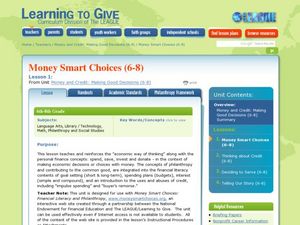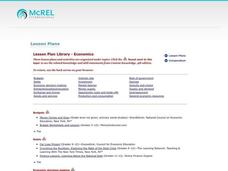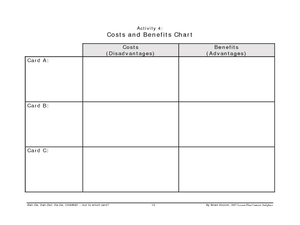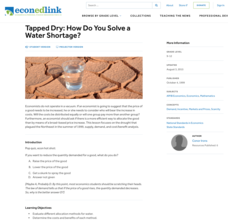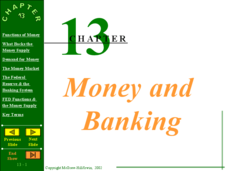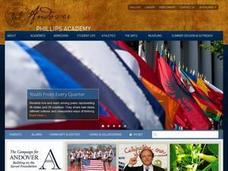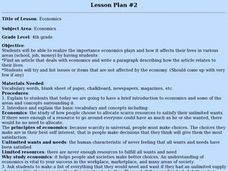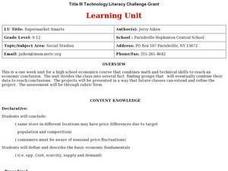Curated OER
Do You Think Like an Economist?
How can you tell if your high schoolers think like economists? Test their knowledge with this worksheet, which provides ten opportunities for your students to exercise critical thinking in the subject of economics. Each question could...
Curated OER
The Great Kapok Tree - Economic Impact of Deforestation
Students read "The Great Kapok Tree" by Lynne Cherry. They, in groups, research the economic impacts of deforestation in areas with rain forest and identify resources that humans use from the rain forest.
Curated OER
You Can't Have it All
In this economic worksheet, 7th graders read about the ideas of choice as well as scarcity for producers and consumers. Students then complete three activities based on economic choices.
Curated OER
Money and Credit: Making Good Decisions
Students participate in activities that teach them how to manage money. In this managing money lesson plan, students set long and short term goals for economic success by having discussions, identifying benefits of saving, and...
Curated OER
Scarcity of Land Throughout the World and in Hawaii
Students discuss the importance of "land." They review the four types of land classification--urban, rural, agricultural and conservation--and participate in an activity involving an apple that demonstrates the use of land in Hawaii....
Curated OER
Micro Economics - Personal Budgeting
Students explore the real world as it relates to money and how people use it. In this money management lesson, students jump into the real world as they role play with money through spending, saving, being married, single, having...
Council for Economic Education
Great Civilizations Develop around Rivers
If you lived in prehistoric times, what kinds of choices could your family make to increase their chance of survival? By making similar decisions in a simulation game, participants discover how specialization creates both opportunity and...
Curated OER
Production Possibilities & Opportunity Cost
In this economics worksheet, 12th graders respond to 15 multiple choice questions about production possiblities and opportunity costs.
Curated OER
Jamestown's Economy
Students identify items made in Jamestown and draw conclusions about their economy. For this Jamestown economy lesson, students use the internet to complete a worksheet which required them to look at photographs of goods made in and...
Curated OER
Charge Cards!
Students identify and define the various types of credit cards and credit card offers. For this credit cards lesson, students identify the pros and cons of managing a credit card account. Students locate information on the Federal...
Council for Economic Education
Tapped Dry: How Do You Solve a Water Shortage?
Learners, after evaluating different allocation methods for water, determine the costs and benefits of each method.
Workforce Solutions
Workforce Solutions 2-3 Lessons
Four lessons and an at-home connection examine 12 jobs. Beginning with an interactive map, scholars view and discuss each one within their small group. Groups focus on the products provided and on their scarcity. Finally, pupils look...
Curated OER
In Great Demand
Focusing on supply and demand, learners discuss economic principles in this lesson related to Wisconsin. After discussing supply and demand, learners answer questions related to a pizza parlor. They talk about profit, as well as other...
Curated OER
Chapter 13: Money and Banking
Where does money come from? If your class can't answer this question (beyond "my parents"), this presentation will be a timely and appropriate way to teach them. Details about currency, money supply, and the banking system, help explain...
Curated OER
A Share in America
Students examine map - reflect on why English colonist kept coming to America (scarcity of land in England / seemingly endless land in America)
Recite line from English poem. They discuss English attitude towards Indians and their lands.
Curated OER
Basic Trading
Young scholars review the basic ideas of exchange. In groups, they discover the incentives for trade and participate in a simulation. They are given a packet of stamps which are worth varying monetary amounts. They discover the concepts...
Curated OER
Supply and Demand
Fourth graders explore the concept of economic goods and bads, and scarce items as it relates to the factors that affect our economy. In this supply and demand lesson, 4th graders are introduced to vocabulary that pertains to supply and...
Curated OER
Non-Western Economic Values
Students engage in a game of economic exchange that present a variety of perspectives on wealth. They read scenarios and write a journal response to the scenario. They discuss how we use money in the Western culture and discuss how...
Curated OER
Calendars - Teaching Kids Economics
Students study economic terms and create a calendar using digital cameras. They advertise the calendar to the whole student population by making posters and singing an advertising jingle.
Curated OER
Economics
Young scholars discover the resources that are available for consumer protection. In a database, they are responsible for entering two new vocabulary words each semester along with a sentence using the word. In groups, they create a...
Curated OER
Supermarket Smarts
Pupils examine how a consumer can make informed choices. They visit stores with a prepared shopping list, record the prices on a spreadsheet, create graphs, and create a Powerpoint presentation comparing the total cost of stores and a...
Curated OER
You Can't Always Get What You Want!
Young scholars examine the concepts of supply and demand. They watch a video, research and identify the effect of fads, and complete the worksheet, Fads of the Last 100 Years.
Alabama Learning Exchange
Personal Economics
Students explain the role of government in protecting consumer rights and the role of private organizations in protecting consumer rights.
Curated OER
Spend, Save, Invest or Donate (9-12)
Students explore the concept of personal finance. In this philanthropy lesson, students examine decisions they make about money as they discover the definitions of philanthropy, resources, scarcity, choice, benefits, costs, opportunity...





